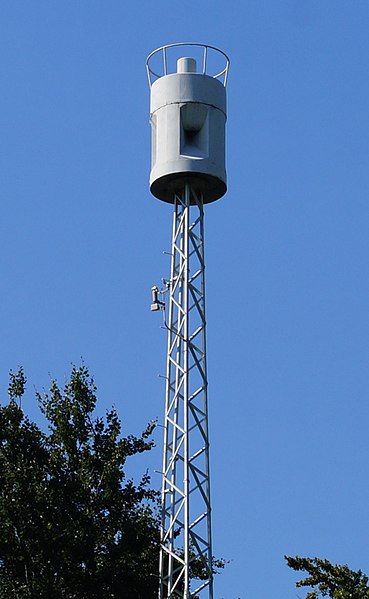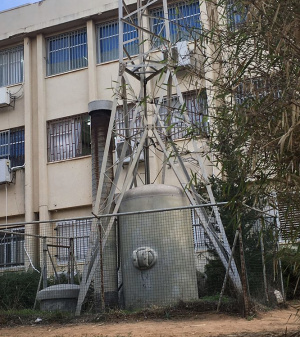HÖRMANN HLS: Difference between revisions
(Re-wrote the information and deleted some un-needed material. Also fixed Grammar.) |
No edit summary |
||
| Line 7: | Line 7: | ||
|hertz = 400 - 530 | |hertz = 400 - 530 | ||
}} | }} | ||
The HLS F-71 is a pneumatic siren that was produced by Hormann gmbH. It was the successor of the | The HLS F-71 is a pneumatic siren that was produced by Hormann gmbH. It was the successor of the Pitnch Bamag Appendix 1 and 2 ,and the Rickmers Werft HLS siren, boasting many improvements. | ||
The sirens contained a diesel engine that drove a generator and an air compressor. The compressor was used to fill a 6000 liter air tank underneath the tower mount for the siren, the generator charged for power. From the compressor, the air is pumped to the siren head through a tube. The head contains a cast aluminium disk rotor with four slots, which was powered by a 48 volt motor. The chopper motor had some sort of speed control mechanism on it, which allows for a linear windup. The chopper windup was also controlled by the amount of voltage in the battery. | The sirens contained a diesel engine that drove a generator and an air compressor. The compressor was used to fill a 6000 liter air tank underneath the tower mount for the siren, the generator charged for power. From the compressor, the air is pumped to the siren head through a tube. The head contains a cast aluminium disk rotor with four slots, which was powered by a 48 volt motor. The chopper motor had some sort of speed control mechanism on it, which allows for a linear windup. The chopper windup was also controlled by the amount of voltage in the battery. | ||
Most | Most F-71 sirens were between 400 and 420 Hz, but some have been known to peak at 530Hz. | ||
If the siren's speed controlling mechanism became nonfunctional, the chopper would be able to windup and run at pretty much any speed. | If the siren's speed controlling mechanism became nonfunctional, the chopper would be able to windup and run at pretty much any speed. | ||
Revision as of 15:08, 16 June 2019
| HÖRMANN HLS | |
[[File: |200px]] |200px]]
| |
| Company | Hormann |
|---|---|
| Produced | late 1960s-1970s? |
| Type | Pneumatic |
| Sound output | 132 |
The HLS F-71 is a pneumatic siren that was produced by Hormann gmbH. It was the successor of the Pitnch Bamag Appendix 1 and 2 ,and the Rickmers Werft HLS siren, boasting many improvements. The sirens contained a diesel engine that drove a generator and an air compressor. The compressor was used to fill a 6000 liter air tank underneath the tower mount for the siren, the generator charged for power. From the compressor, the air is pumped to the siren head through a tube. The head contains a cast aluminium disk rotor with four slots, which was powered by a 48 volt motor. The chopper motor had some sort of speed control mechanism on it, which allows for a linear windup. The chopper windup was also controlled by the amount of voltage in the battery. Most F-71 sirens were between 400 and 420 Hz, but some have been known to peak at 530Hz. If the siren's speed controlling mechanism became nonfunctional, the chopper would be able to windup and run at pretty much any speed.
Due to replacements with more modern sirens, there are no HLS F-71 sirens in service. The HLS F-71 sirens in Germany were de-commissioned between 1990 and 2000, Isreal's were turned off in 2010. Most locations in Germany have been removed with only the towers remaining, which are used to house radio antennas, or to hold their newer Hormann ECN sirens. In Isreal, none have been removed, even after their replacements with ATI HPSS-32 sirens.
